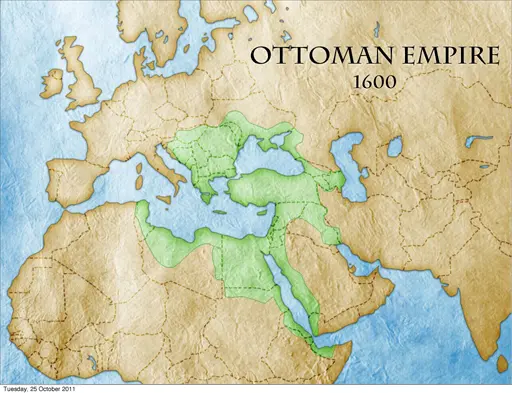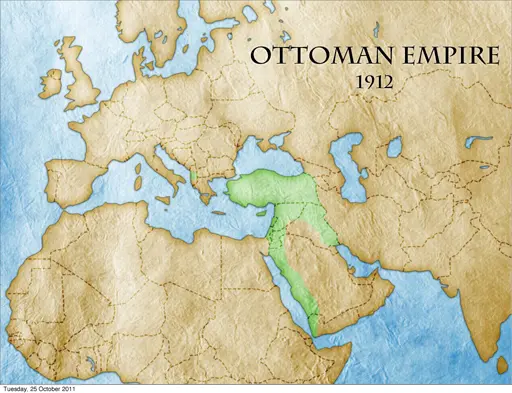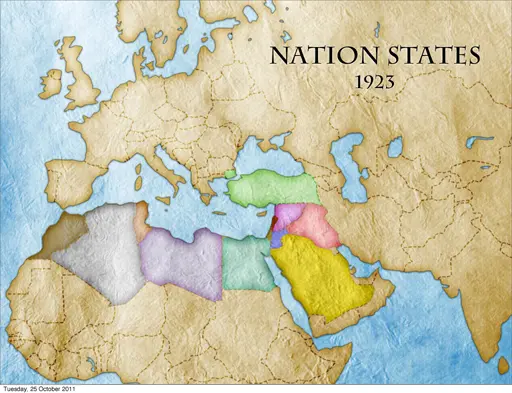Empires to Nations
Fall of the Ottoman Khilafa
Topics:
- Colossus from the West
- Into The Lizards Hole
- The Nation of Ataturk
- Dark Hour : Break up of the Ottoman Empire and the end of the Khilafah
- Zionist Nemesis : Formation of the Jewish nation state - Israel
- The New Age: Call for freedom, nationalism, socialism and secularism
- Islam the unconquerable
- Days of Rage : Uprisings reviewed
Islamic Legacy : Colossus from the West
In the year 1683, Ottoman forces under Kara Mustapha Pasha besieged the European city of Vienna. The Ottomans had amassed an army of over a hundred thousand men in an attempt to take control of the city and open a gateway to Western Europe for future Muslim dominance. A combined European force managed to narrowly avoid defeat and repelled the Ottoman attack.
Since then, Western European nations had been in the ascendancy both militarily, and politically while on the contrary, the Muslim world was in demise. In less than 200 years since the siege of Vienna in 1683, up to 70% of the Muslim world was under the rule of European Imperialists.
By 1913, eleven European countries ruled over 50% of the world and controlled over 80% of the global economic output.
What allowed Europe to dominate the world while the Muslims, once dominant themselves, fell woefully behind?
Empires to Nations - Into the Lizards hole
In the year 1820 Rifaid At-Tahtawi a graduate from the Al-Azhar University of Cairo, traveled to France from Egypt along with other subjects of the Ottoman Empire to learn about the French way of life and system of government. He spent 5 years carefully taking note of all aspects of the French society.
On his return he published a book outlining his observations and conclusions. He noted that the French society was a place of disbelief and of an inferior faith and culture. However the French had surpassed the Muslims in terms of technology, economics and military might. The key to this success he added, was to be found in the political reformation of the French. The French constitution treated the KIng and its subjects alike, its judicial system was applied equally, and there was freedom of expression which allowed an exchange of ideas. He believed it was a duty for the Muslim Ummah to regain its scientific and economic superiority over its rivals. The question was how?
In the 1800s for the first time in over a thousand years the Muslims were lagging behind the West and were forced to react. They decided that the best way to catch up with the West was to emulate them, and in doing so followed the lizard into its hole, and ultimately to their own destruction.
How did the reaction from the Muslim world to the resurgence of the West lead to its own demise?
Empire to Nations - The War to end all Wars
By the beginning of the 19th century intense imperial rivalry and competition had put Europe on the brink of war. The Ottoman empire was at its weakest stage. It had lost all its European and African territories to the European powers. The Turks needed an ally to protect them from these land hungry imperial forces. That ally came in the form of Germany who by then was growing to become the most powerful force in Europe.
When World War 1 erupted in July 1914, the Ottomans had a choice of either remaining neutral, or to join the side of the Germans. The Sultan called for a Jihad against the English, French and Russians and by doing so had chosen the option of war. It was the last war the Ottomans would ever fight.
The Ottomans fought tenaciously. In Galipoli the Turks struck the Allied forces a major blow by repelling their forces both by land and sea. In the Hijaz however, the Arabs in search of an independent state joined with side of the British and revolted against the Ottomans. Eventually the Germans along with their Ottoman allies were brought to their knees and had to surrender.
In these humiliating times for the Muslims, one man was making a name for himself by constantly defying the British. He was the only Ottoman commander to remain undefeated during the war and was labelled by Winston Churchill as the greatest the Ottomans had. The Great War may have seen the demise of the Ottomans, but it would be the arena where Mustapha Kemal Ataturk would rise to the fore.
Where will you stand on Turkish history's most divisive figure?
Empires to Nations: The cycle of Tyranny
Nawal El Saadawi working in a hospital in Cairo reports on the day when freedom was achieved from the tyrants,
"Suddenly as we stood there patients rushed out of the wards shouting 'Long live the revolution!' I could see their mouths wide open, their arms waving in the air, their tattered shirts fluttering around their bodies. It was as though corpses from the dissecting hall had suddenly risen from the dead and were shouting, 'Long live the revolution!' The men carrying the coffins put them down and mixed with the crowd shouting, 'Long live the revolution' and women who had been mourning the defunct started to shrill in celebration."
The year is 1952. Cairo was in an atmosphere of joy and celebration that spilled into the streets and lasted all night. Egypt is ecstatic over the rise of the Free officers movement to power. They were celebrating their freedom from an oppressive and corrupt ruler.
60 years later...
The year is 2011. Cairo was in an atmosphere of joy and celebration that spilled into the streets and lasted all night. Egypt is ecstatic over the fall of Hosni Mubarak, a leading figure of Free officers movement. They were celebrating their freedom from an oppressive and corrupt ruler.
Same old story? What has changed? Will the cycle continue?



